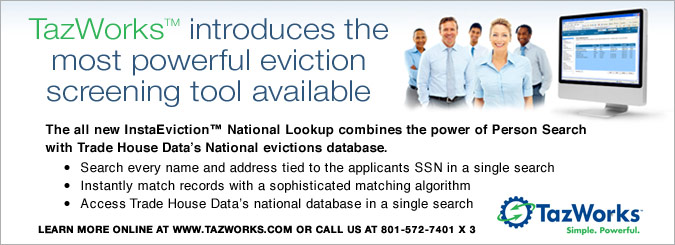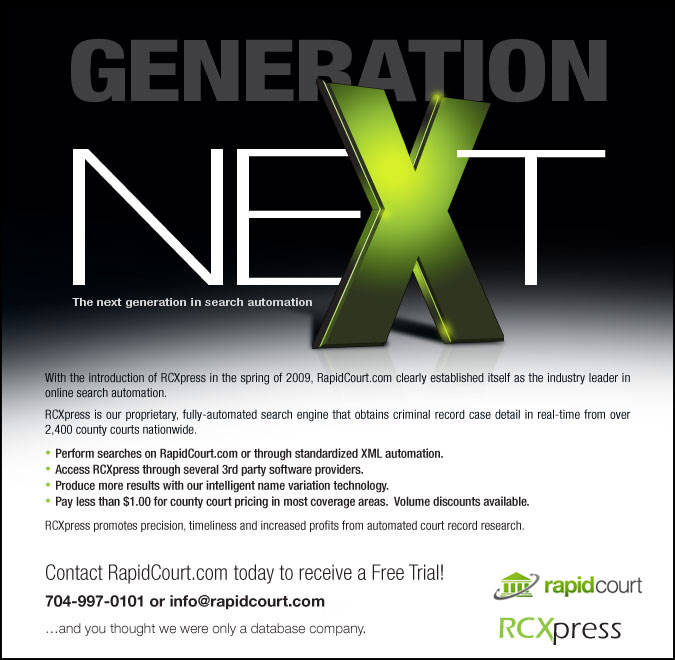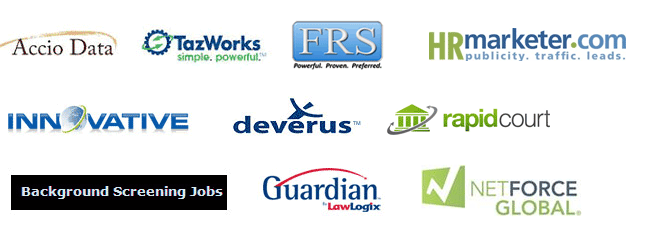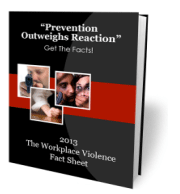| BACKGROUND
SCREENING NEWS |
2012
Baker's Dozen Customer Satisfaction Ratings: Screening
HRO Today's
Baker's Dozen rankings announced:
Once collected, response data are loaded into the HRO Today
database for analysis to score each provider that has a statistically
significant sample. For this survey, we required 13 responses
from 10 companies, and we received feedback from more than 700
verified customers.
1. SecurTest,
Inc.
2. TriCor Employment Screening Ltd
3. Background Profiles
4. FirstPoint Background Screening Resources
5. TalentWise
6. Aurico
7. Verifications Inc.
8. Sterling
9. Global HR Research
10. Universal Background Screening
11. EmployeeScreenIQ
12. IntelliCorp
13. Orange Tree Employment Screening
Read
More
Click here to view the Overall leaders and the Breadth of Service
leaders.
Click
here to view the Size of Deal leaders and Quality of Service
leaders.

National Retail Federation Tells Civil Rights Commission Criminal
Background Checks Should Continue
National
Retail Federation (NRF) asked the U.S. Commission on Civil Rights
to closely examine new guidelines on the use of criminal background
checks to screen job applicants, saying the regulations threaten
to undermine retailers' attempts to protect their customers
and employees. "NRF believes that the criminal background question
needs to remain on employment applications," NRF Vice President
for Loss Prevention Richard Mellor said. "This vital
information is every bit as relevant as an applicant's education,
previous employment experience and formal training."
"The retail industry wants to keep our workplaces safe," Mellor
said. "Earlier interpretations of the guidelines were working
fairly (but) this overly burdensome guidance will add risk,
increase expenses, and cause confusion and legal challenges
for many retailers."
Mellor
was among witnesses testifying at a hearing the civil rights
panel held on guidelines issued in April by the federal Equal
Employment Opportunity Commission.
Read
More

E.U. Privacy Watchdog Expects No Immediate Change in Data Protection
Standoff with U.S.
The European Union's top data protection watchdog expects only
a select band of U.S. IT companies will meet E.U. data protection
standards for some time to come. Under the E.U. Data Protection
Directive, personal data cannot be transferred out of the E.U.
unless the destination country's data protection laws are deemed
adequate. There are, however, exceptions for U.S. companies
that agree to abide by seven "safe harbor privacy principles"
for the protection of E.U. citizens' personal data. This data
includes sensitive information such as patient records required
for telemedicine. The U.S. Ambassador to Europe, William Kennard,
called for the U.S. to be given "adequate" status in a speech
at the Annual European Data Protection and Privacy Conference.
To date, only a tiny number of jurisdictions have been deemed
adequate: Argentina, Canada, Guernsey, the Isle of Man, Israel,
Switzerland and Uruguay. European Data Protection Supervisor,
Peter Hustinx, thinks the ambassador was being too optimistic
and suggests that rather than declaring a company's laws adequate
outright, a sectoral approach to data adequacy might be more
useful.
Read more

Lack of Criminal Background Checks by National Youth Organization
Led to Alleged Sexual Abuse of Youths
The refusal
of the Boy Scouts of America (BSA) to conduct criminal background
checks on all volunteers until 2008 allowed convicted child
sex offenders to join the organization and led to a significant
amount of alleged sexual abuse of youths, according to a Los
Angeles Times analysis of confidential BSA files. The BSA -
one of the oldest and largest youth groups in the United States
- admitted more than 230 men to Scouting with previous arrests
or convictions for sex crimes against children who were accused
of molesting nearly 400 boys in Scouting from 1985 to 1991.
The Times also reported previously expelled men slipped back
into the program to molest again and that BSA officials failed
to report hundreds of alleged abusers to police and often hid
allegations from parents and the public. While background checks
became required for Scouting employees in 1994 and mandatory
for all new volunteers in 2004, the BSA refused to conduct checks
on current volunteers who were already in the organization until
four years later. According to the Times, BSA officials argued
background checks would cost too much, scare away volunteers,
and provide a false sense of security and they successfully
lobbied to kill state legislation that would have mandated FBI
fingerprint screening.
Read more



| BACKGROUND
SCREENING NEWS - continued |
2013
Brings Significant Criminal Background Check Changes for Ohio
Home Health Agencies
The Ohio
Department of Health has proposed new administrative rules scheduled
to take effect January 1, 2013 that will significantly impact
the obligations of a home health agency ("HHA") regarding background
checks of its current and potential employees.
The new
rules require HHAs to conduct criminal background checks on
applicants before hiring and on all employees at least once
every five years. HHAs must initially check current employees
hired prior to January 1, 2008 no later than thirty days after
the anniversary of the employee's date of hire and employees
hired on or after January 1, 2008 no later than thirty days
after the fifth anniversary of the date of hire. Prior to conducting
the required checks, the HHA must check six specified electronic
databases. The new rules also enhance the list of "disqualifying
offenses" and provide a tiered exclusionary period system based
on the offense committed.
The new
rules alter the definition of "direct care," which will include
skilled nursing care, physical therapy, speech-language pathology,
occupational therapy, medical social services, and home health
aide services provided in a patient's home. It further includes
any activity that requires the person performing the activity
to be routinely alone with the patient or routinely have access
to a patient's personal or financial documents. The new rule
also broadens the term by applying it to "a patient" rather
than merely "an older adult" as under the current rule.
Read More

Use
of Advanced Truth Verification Technology Increases
The Computer
Voice Stress Analyzer CVSA ® is the only voice stress analyzer
in the world with two US Patents, and the only system worldwide
incorporating the FACT® scoring system, which uses scientifically
validated processes to reliably and precisely evaluate the results
of CVSA examinations. The CVSA is now used by close to 2,000
agencies and is the most widely used truth verification system
in the US, far surpassing the number of agencies that use older
polygraph equipment.
A soon to be published research study will report the accuracy
rate of the CVSA is greater than 95%, an assertion long made
by the system's manufacturer. The study's results are further
supported by current US Government funded voice analysis research
which has found voice technologies performed well for border
security applications.
Research conducted in both Europe and the US over the past several
years supports the superiority of voice stress analysis technology
over older polygraph equipment, which explains the rapid adoption
of the CVSA for truth verification applications in Latin America.
Read
More

The Nuances of Statewide Searches
There are
two types of statewide searches, it is important to distinguish
between two types: a state repository
and a unified statewide database. It's important to
understand the differences.
A state
repository is a law enforcement database that contains some
or all records of law enforcement activity related to a given
subject. As a general rule, anytime someone is arrested at the
local level, there is a robust mechanism to report that information
to the state repository. It is this mechanism that in part,
makes certain that individuals who are arrested go to court.
By contrast,
there is an administrative office of the court statewide database,
which is sometimes referred to as a unified statewide database.
This is the state court administrators' consolidated portal
by which you can look at the individual case results of some
or all of a subject's state/county court records.
Organizations
commonly use a state repository search when there is a statutory
mandate that requires them to do so. In some instances repository
searches may be limited by a statutory requirement. Unified
searches are a viable alternative if there is no requirement
or guidance compelling or dictating the nature or scope of a
background check. In most instances the turnaround time is shorter
and the methods of access are less burdensome.
Read More

Tenant
Screening! It's Critical If You're a Rental Apartment Landlord!
Tenant screening is crucial for landlords and property
management companies. It's better to be prepared; so always
trust, but verify! In today's rental atmosphere getting a property
rented to a qualified tenant will require a ridged tenant screening
check that includes a complete and informative application,
credit check the tenant provides, first and last month rent,
cleaning deposit, and an extra deposit for any pets. And since
most landlords already have their hands full with the tedium
of the daily activities of overseeing a plethora of rental units,
property management companies have pretty much taken over the
tenant screening process. They will handle rental payments and
deposits and when necessary, initiate the eviction of a tenant.
However, one must "tread softly" in dealing with all tenants
thanks to the Fair Housing Laws. Some states have extremely
strict tenant-landlord laws that many times favor the tenant.
It has been said by many property owners that about 90% of most
any tenant problems can quickly be eliminated via your initial
tenant screening check.
Read
More

LeaseRunner Tool Puts Rental Applications in Ads
Landlords and real estate professionals can now incorporate
rental applications and tenant screenings right into rental
listing ads. The Colorado based, paperless
property leasing company, LeaseRunner, has launched its "Apply
Now" service, allowing users to accept rental applications and
screen potential tenants directly from ads on Craigslist, Facebook,
Twitter, WordPress and other websites. LeaseRunner digitizes
the rental process for property managers and tenants, including
rental applications, background checks, e-signatures and rent
collection. The Apply Now service is free to LeaseRunner customers
and, should the landlord require them, prospective tenants pay
for any credit or background checks. "By integrating
applications and screening into the listing ad, LeaseRunner
is transforming the leasing process," said Joe Buczkowski, CEO
and founder of LeaseRunner. "Landlords save time, money and
hassle. Renters gain the ability to complete the leasing process
digitally and securely." Moreover, other than
any screening fees, there's no downside risk to the applicant.
The tenant does not share his or her Social Security number
with the landlord, and LeaseRunner's background checks do not
'ding' the applicant's credit score.
Read
More

| Welcome
to the U.S. Legal Challenge Question! |
Sponsored By:


As the background
screening industry continues to get more competitive the firms
that will ultimately succeed will be those that create competitive
advantage through their people by offering continuous learning
opportunities to heightened their knowledge and capabilities.
We believe that having employees that are very knowledgeable about
the legal landscape of background screening is essential to continued
success.
We are grateful
to Ann Cun, Counsel and Principal Editor at LawLogix,
Inc for providing the expertise for this valuable endeavor.
For information regarding the answers to the Legal Challenge Questions,
please contact Ann Cun, Counsel and Principal Editor, LawLogix
Group, Inc. at (602) 357-4240 and for more information about LawLogix
e-verify and immigration support services please visit www.Lawlogix.com
Please choose
your answer by clicking on it:

Take
Privacy Seriously - Why the Anne Marie Rasmusson Case Matters
to Employers
The $1 million-plus
settlement in the Anne Marie Rasmusson case is a costly example
of why employers need to make certain that their employees do
not abuse their access to confidential information. Rasmusson,
a former St. Paul police officer, filed a lawsuit against numerous
Minnesota cities and police officers in March of 2012 alleging
that her driver's license information was improperly accessed
425 times by 104 police officers between 2007 and 2011. Rasmusson's
complaint asserted claims arising under the Driver's Privacy Protection
Act of 1994, as well as claims for invasion of privacy. Many police
officers who accessed Rasmusson's data acknowledged that they
did not have legitimate reasons to do so. The overall theme of
the lawsuit was that the various police departments and officers
involved allowed a culture to develop in which her private data
was not protected and was routinely accessed for illegitimate
reasons. While most employers do not have employees who have access
to driver's license data, many do have employees who have access
to other private and confidential data. Employers who fail to
ensure that strong policies and procedures are in place to prevent
employee abuse of confidential data may be subject to significant
liability.
Read more

DOT Reiterates that Marijuana Use by Safety-Sensitive
Transportation Employees is Not Authorized, Regardless of Recent
Passage of State Recreational Marijuana Use Laws
The U.S.
Department of Transportation's (DOT) Office of Drug and Alcohol
Policy Compliance has issued a Notice to address the recent passage
of state initiatives purporting to legalize marijuana use for
recreational purposes. The DOT requires testing of applicants
and employees in safety-sensitive transportation positions for
marijuana, cocaine, opiates, amphetamines, and phencyclidine.
Applicants must be drug tested before they begin performing DOT-covered
safety-sensitive duties, and employees must be drug tested in
certain circumstances, including following an accident, randomly,
and when reasonable suspicion of drug use exists. During that
review process, the test subject is permitted to provide the medical
review officer (MRO) with information that would explain the positive
test result, such as a prescription. If the test subject provides
a legitimate medical explanation for the confirmed positive test
result, then the MRO will report the test result to the (prospective)
employer as verified negative. If the test subject does not provide
a legitimate medical explanation, he or she must be removed from
safety-sensitive duties and referred to a substance abuse professional
for evaluation. Applicants for and employees in safety-sensitive
transportation positions will not be allowed to explain away a
confirmed positive test for marijuana based on recreational or
medical use purportedly authorized by state law.
Read more

FTC
to Study Data Broker Industry's Collection and Use of Consumer
Data
The Federal
Trade Commission (FTC) issued orders requiring nine data brokerage
companies to provide the agency with information about how they
collect and use data about consumers. The agency will use the
information to study privacy practices in the data broker industry
and to make recommendations on improved privacy practices. Earlier
this year, the FTC called on the data broker industry to improve
the transparency of its practices as part of a Commission report.
In the Privacy Report, the FTC set forth a voluntary framework
of best practices for businesses based on the concepts of privacy
by design, consumer control, and increased transparency for the
collection and use of consumer data. The Report noted that while
data brokers collect, maintain, and sell a wealth of information
about consumers, they often do not interact directly with consumers.
Rather, they get information from public records and purchase
information from other companies. As a result, consumers are often
unaware of the existence of data brokers as well as the purposes
for which they collect and use consumers' data. There are no current
laws requiring data brokers to maintain the privacy of consumer
data unless they use that data for credit, employment, insurance,
housing, or other similar purposes.
Read
more



| TENANT
SCREENING - continued |
Keytrak
Partners With ScreeningOne To Help Property Owners Identify Risky
Tenants
Keytrak,
a leading provider of key and asset management systems, recently
partnered with ScreeningOne, a web-based tenant screening systems
provider, to help companies in the multifamily industry manage
the potential risks posed by tenants.
"We Are Pleased
To Partner With ScreeningOne, as this will help us deliver additional
benefits to the multifamily industry. Screening potential tenants
will reduce the risk of loss for properties and add peace of mind,
which are also major benefits of Keytrak key management systems,"
said Keytrak Vice President of Sales Richard Battle.
Keytrak provides
key control systems that secure keys and assets in a tamper-proof
drawer, record employees' use of keys and supply detailed reports
on system transactions. By partnering with ScreeningOne, Keytrak
will be able to help companies in the multifamily industry uncover
security concerns and limit their liability. "Keytrak Is widely
recognized as a market leader in the multifamily industry, so
we are very excited to help them enhance and expand their product
offering to include our tenant screening services. Property managers
and landlords across the country can now go to one place for all
of their risk management needs," said ScreeningOne President Mike
Byrd.
Read
More


| DATA
PROTECTION & PRIVACY |
The
Centre for Information Policy Leadership at Hunton & Williams
LLP Releases Accountability Self-Assessment Tool to Help Organizations
Evaluate Their Privacy Programs
The Centre
for Information Policy Leadership at Hunton & Williams LLP
(the "Centre") released today an accountability self-assessment
tool designed to help organizations evaluate their internal privacy
programs and practices. The tool is the product of the Global
Accountability Project for which the Centre serves as secretariat.
"In an accountability
model, organizations implement and demonstrate adherence to a
comprehensive data protection compliance program," says Marty
Abrams, President of the Centre. "In collaboration with
experts from privacy enforcement agencies, industry, civil society
and academia, we've outlined the key elements of a sound program
to help organizations take the concrete steps necessary to be
accountable."
The Accountability
Project is a global, multi-stakeholder process that convenes academic
experts, privacy enforcement agencies, government representatives,
industry and civil society to develop an approach to data protection
that relies on the fair information practice principle of accountability.
At meetings in Dublin in 2009; in Paris in 2010; Madrid in 2011;
and in Brussels in 2012, the Project developed essential, commonly-accepted
elements of accountability and articulated the nature of the programs
and processes accountable organizations would implement. The Project
will continue its work in Warsaw and Toronto in 2013
For information
contact Eleanor Kerlow, Senior Public Relations Manager
Hunton &
Williams LLP, +1 (202) 955-1883 or at ekerlow@hunton.com
Read More
Access Self-Assessment Tool

Incident
Response Plan Template: A New Deliverable From The NAPBS Best
Practices Committee
The Data
Breach Prevention Sub-Committee of Best Practices Committee of
NAPBS announced their newest deliverable for NAPBS membership,
titled Incident Response Plan Template. It's a well-formatted
and comprehensive template for any company handling personally
identifiable information.
Only available
to NAPBS Members. To access sign on and then hover over Members
navigator button. Scroll down the drop down list to Member Resources,
click on Member Research and Background Information, click
on Other Resources and click on Incident Response Plan
Template
Read
More



New
Jersey's Appellate Division Limits Parameters of Workplace Drug
and Alcohol Policy
In A.D.P.
v. ExxonMobil Research & Engineering Co., the Superior
Court of New Jersey, Appellate Division reversed in part the lower
court's ruling granting summary judgment by holding that ExxonMobil
applied a facially discriminatory drug and alcohol policy against
its employee based on her disability of alcoholism. The employer's
policy's requirements of total abstinence and a minimum of two
years of random testing for only those employees who were identified
as alcoholics, were found to demonstrate hostility toward members
of the employee's class. The Appellate Division concluded that
the employee's employment was terminated not because of her job
performance but solely because of her disability. This decision
underscores the imperative that employers must carefully draft
and consistently apply workplace alcohol and drug policies. Although
employers are permitted under the law to maintain an alcohol-
and drug-free workplace, employers cannot adopt a one-size-fits-all
policy. To avoid liability, employers must remember to perform
individual assessments, reasonably accommodate their alcohol-
or drug-disabled employees who are otherwise qualified, and refrain
from adverse actions unless they are based on legitimate, non-discriminatory
reasons.
Read more

Employers'
Anti-Drug Policies Remain Enforceable Under Colorado's Marijuana
Regulation Act
"Amendment
64: The Regulate Marijuana Like Alcohol Act of 2012," amends the
Colorado state constitution to allow persons over 21 to possess
up to one ounce of marijuana and grow up to six marijuana plants
for personal use. It also authorizes the licensing of retail facilities
for sales of marijuana to adults. Public consumption and unlicensed
sales in the state will remain illegal. The licensing provisions
of the amendment will not go into effect until 2014. This is intended
to provide the state time to develop regulations for the sale
and taxation of marijuana. The personal use and cultivation provisions,
however, become effective as soon as Governor John Hickenlooper
signs the bill, which by state law must be within 30 days of the
November 6 vote. Employers may continue to enforce their drug-testing
policies against employees and applicants who test positive for
marijuana, to publish and enforce policies prohibiting the possession
or consumption of marijuana during working hours, and to discipline
any employee whose job performance is impaired because of the
use of marijuana.
Read
more

Florida Outlaws 22 Additional Synthetic Drugs
Florida Attorney General Pam Bondi has signed an emergency rule
that outlaws 22 new synthetic drugs. The outlawed drugs are various
forms of baths salts, or synthetic marijuana, known as K2 or Spice.
In 2011, the state legislature banned a number of synthetic drugs.
This year, the legislature banned additional versions of the drugs.
Bondi is planning legislation in the coming year to permanently
outlaw the 22 drugs targeted in the new emergency rule. Several
of the drugs could be appealing to children because one has the
consistency of cotton candy, while another is marketed as a "Scooby
Snack." Law enforcement began contacting convenience stores this
week, asking them to voluntarily surrender any products that have
been newly banned. The emergency rule makes it a third-degree
felony for someone to "sell, manufacture, or deliver, or possess
with intent to sell, manufacture or deliver" these drugs.
Read more

Workplace
Drug Testing vs. Marijuana Legalization in Washington State and
Colorado
Although
some universities and organizations in Washington and Colorado
have already issued statements that they are not going to change
anything in their drug testing policy in response to the legalization
of recreational marijuana use, others continue to consult with
their lawyers and await further announcement from the government.
Nothing within the provisions of Colorado and Washington State's
marijuana legalization measure specifically addresses employers'
rights to drug test their employees. Legal expert, Michael W.
Groebe from Foley & Lardner LLP, advises employers to continue
focusing on the employee's conduct while at work because the new
laws will unlikely protect them from discipline if they are under
the influence of marijuana at work. Groebe also stressed that
employers should remember that marijuana remains prohibited under
federal law. "Even with Colorado's 'Lifestyle' law that prohibits
employers from disciplining employees for engaging in lawful conduct
while off-duty, federal law still makes the use of marijuana unlawful,"
he said. Additionally, if an employer requires drug testing, including
the policy in the employee handbook and informing job applicants
and existing employees could prevent the organization from wasting
money on pre-employment drug tests.
Read
more

A
Diverse Landscape Of State Laws
As more types
of drug testing technologies arrive on the scene, it is essential
for employers to be aware of laws governing drug testing practices
in the workplace. Speaking only of the private sector, Bill Current,
president of WFC & Associates, a national consulting practice
for testing companies, says that the existence and extent of drug
testing laws vary considerably among states.
Among the
states that have drug testing laws, two different types of laws
exist, and Current explains these as "mandatory" and "voluntary."
The difference between the two is fairly straightforward. Minnesota,
a state that has a mandatory law, says that any employer that
practices drug testing in the state must obey the provisions of
that specific law. Florida, a state that has a voluntary law,
offers an incentive to encourage employers to conduct drug testing.
In this specific case, that incentive is a 5% workers compensation
premium discount, but in order to qualify for it the employer
has to drug test according to guidelines provided by the state.
It begins
to get complicated with employers that do business in multiple
states. Current says, "If you're a multistate employer, you're
constantly grappling with the various state laws that apply to
you. The basic rule is that all applicable state laws apply.
Read More

Public
Record Update
Sponsored by:

Public
Record Update
By Mike Sankey, PRRN
| BRB's
FREE RESOURCE CENTER |
For the MOST
COMPREHENSIVE RESOURCE describing all access methods, restrictions,
fees, and search procedures on over 26,000 government and private
agencies visit the Public
Record Research System (PRRS-Web) . We provide the extensive
details and in-depth data you will not find doing a Google search!
| 
CRAHelpDesk
PO Box 27869
Tempe, AZ 85285
800-929-3811
Fax: 800-929-3810
mike@brbpublications.com
www.CRAHelpDesk.com
|
Compliance with the myriad of state laws is a complex
subject affecting CRAs and their clients. The State Rules
Register provides an uncomplicated explanation in plain
English of state laws for what is reportable to the client,
usable by the client, and the necessary steps to take
to be in compliance with state laws. Also included are
best practices, practical tips, and ongoing notification
when state and federal laws change. Create your own matrix
reports. Use the special Resource Tabs of Guidelines and
Special Instructions.
See
www.CRAHelpDesk.com.
We
Help Consumer Reporting Agencies |
For more
information contact Michael Sankey at mike@brbpublications.com
or visit www.brbpublications.com/updates.aspx

Relying
on References in the Recruiting Process
When it comes
to checking references, a recent survey has revealed surprising
insights into just how closely HR leaders rely on the personal
referees provided by applicants. Close to two thirds of respondents
reported having contacted a referee who did not give positive
feedback about the job applicant. In addition, a significant proportion
of those polled (29%) said that they had caught a fake reference
on an applicant's CV. Results revealed that hiring managers and
HR practitioners do rely, to an extent, on references. Some 80%
of employers said that they contact a referee when evaluating
potential employees and 16% of those respondents said that they
would do so even before inviting the candidate to a job interview.
In addition, 70% of employers acknowledged having changed their
minds about a candidate after having spoken with a referee. Perhaps
most surprisingly, almost half of those said that they came away
with a less favorable opinion of the applicant while only 23%
said that the referee gave them a more favorable opinion of the
candidate than they had previously. Thirty-one percent said references
haven't swayed their decisions on a candidate.
Read
more

Nearly
Three-in-Ten Employers Have Caught a Fake Reference on a Job Application
A new study
from CareerBuilder cautions job seekers about the references they
cite when applying to companies. Three-in-five employers (62 percent)
said that when they contacted a reference listed on an application,
the reference didn't have good things to say about the candidate.
Twenty-nine percent of employers reported that they have caught
a fake reference on a candidate's application.
The study
included 2,494 hiring managers and human resource professionals
and 3,976 workers across industries and company sizes. The study
reported that 80 percent of employers said they do contact references
when evaluating potential employees. Sixteen percent of these
employers will contact references even before they call the candidate
for a job interview.
Sixty-nine
percent of employers said they have changed their minds about
a candidate after speaking with a reference, with 47 percent reporting
they had a less favorable opinion and 23 percent reporting they
had a more favorable opinion. Thirty-one percent said references
haven't swayed their decisions on a candidate one way or the other.
Read More

One
Site! Many Suppliers! |

Looking
for the Top Suppliers in the Industry? Need to find a new Supplier?
Visit our VENDOR
SHOWCASE which features suppliers to the Background
Screening Industry.
2012
Fall Edition of Suppliers to the Background Screening industry
Guide
Now Available!
Click
here or on image to get a copy

Contact
Barry Nixon at wbnixon@aol.com
for information on getting your firm listed in the Summer Edition.

Experts
Predict a Hiring Boom in 2013
Hiring is
expected to pick up in the New Year, according to career counselors,
but uncertainty surrounding the strength of the economy will likely
prevent the hiring season from being as robust as in years past.
Last month, the economy added 146,000 jobs, well beyond the expected
85,000 experts predicted. And a strong holiday shopping season
is buoying hopes that December will beat expectations as well.
"Historically,
the first quarter of any fiscal year is always the best time to
expect hires because of the normal cycle of business," says Robert
Meier, president of Job Market Experts. "Companies are kind of
lying low, but now is the time when they do the talent evaluation.
If you can get into the evaluation cycle, you have a good chance
of getting hired."
But Philip
Noftsinger, creator of the CBIZ Small Business Employment Index,
doesn't expect hiring in 2013 to match the employment hikes that
have occurred during past economic recoveries. He says uncertainty
about the impact of politicians on the recovery and the inability
of job seekers to properly market themselves will delay many jobs
from being filled. The outcome of the fiscal cliff-the tax increases
and spending cuts set to take effect at the end of the year-is
also directly tied to the state of the job market. "If we don't
reach compromise [on the cliff], I think you're looking at demand-driven
hiring," he says.
Read More

Unemployment Rates Fall In 45 States In Nov.
Unemployment
rates fell in 45 states and the District of Columbia in November,
reflecting a sharp drop in the national jobless rate despite Superstorm
Sandy and the budget standoff in Washington.
The jobless
rate fell dramatically in several states, with the largest declines
in Louisiana and Nevada. Nevada continued to have the highest
unemployment rate at 10.8%, followed by Rhode Island at 10.4%.
North Dakota, which is making the most of an oil boom, continued
to have the lowest rate at 3.1%
The Federal
Reserve agreed to continue its easy-money policies, with Fed Chairman
Ben Bernanke noting the labor market is "a bit weaker" than the
jobless rate suggests.
Government
estimate of economic growth in the third quarter were revised
to 3.1% from 2.7%, noting exports and consumer spending were stronger
than initially believed. And while consumer sentiment has weakened
during federal budget battles, the housing market continues to
rebound, and the government reported Friday that personal spending
rose solidly in November.
Read
More

STOP
STRUGGLING WITH WRITING AND PUBLISHING YOUR NEWSLETTER: |

We can help
you have a high quality e-newsletter to help nurture your relationship
with your clients and attract new clients. Our customized newsletter
service will take over your newsletter task or create a new one
for you. We can manage the creation of your newsletter for you.
We are constantly
researching information to use for The Background Buzz and
you can put our research to use for you. Using the information
rich content from The Background Buzz (minus the ads
and competitors information) we will create a custom newsletter
for you.
Use your staff’s
time to do more valuable work and save all the hassle of researching
or writing articles, formatting and managing all the other ezine
tasks with our customized ezine process.
Contact Barry
Nixon at 949-770-5264 or at wbnixon@aol.com
for more information.

Confidently
Compliant
The Immigration and Customs Enforcement's (ICE) pursuit of employers
who violate federal immigration compliance laws is expected to
be moving full speed ahead in 2013, and in some instances accelerating
in comparison to prior years. As a result of both substantially
increased funding for enforcement actions and an outcome of the
public debate about illegal immigration, ICE will continue to
audit thousands of employers during the next year. I-9 employment
verification is not a choice-it's the law. Although the paperwork
appears deceptively simple, employers continue to struggle with
properly completing the form on time, which often results in substantive,
procedural, or technical violations. Fines for each incorrect
or missing Form I-9 range from $110 to $1,100 per instance. Unauthorized
worker violations start at $375 and can climb to $16,000 per undocumented-or
improperly documented-employee. To lessen the risk of immigration
compliance liability, employers should conduct periodic internal
audits and adopt best practices and standard operating procedures
to show good faith compliance practices.
Read
more

E-Verify
Begins Checking Driver's License and ID Cards from the State of
Florida
The United States Citizenship and Immigration Services
(USCIS) announced that the E-Verify system now checks driver's
license and ID cards from the state of Florida when presented
by a new hire as a List B document for the Form I-9. Florida is
the second state (behind Mississippi) to join the Records and
Information from DMVs for E-Verify (RIDE) Program, which was officially
launched last year. The E-Verify RIDE initiative automates motor
vehicle document verification between participating Motor Vehicle
Agencies (MVA) and the E-Verify employer. The process itself is
fairly straight-forward: if the employee presents a driver's license,
driver's permit, or state-issued ID card during the I-9 process,
the employer is prompted to enter the document number and expiration
into the E-Verify system which will automatically check against
MVA records. The system will then check to see if the data itself
is valid and issue a tentative non-confirmation (TNC) if it does
not match DMV records. The USCIS has been looking to partner with
even more states to broaden RIDE's footprint, but they've faced
various obstacles, including concerns over privacy of the shared
data and technical resources.
Read more

OSC Doles Out E-Verify Non-Compliance Punishment
to Oregon Homecare Provider
The Justice
Department's Civil Rights Division Office of Special Counsel (OSC)
has issued another penalty case to an Oregon-based homecare provider
for sick and elderly patients for violating three cardinal E-Verify
rules. The company failed to provide an employee with their Tentative
Non-Confirmation (TNC) documentation and an opportunity for the
employee to contest it, demanded additional identity and employment
authorization documents, and refused to allow the employee to
work when they were unable to furnish the demanded documents.
The company eventually settled this case by agreeing to pay approximately
$525 in back wages and a civil fine of $1,210. Other conditions
included HR training to avoid employment eligibility verification
discrimination and reporting and compliance monitoring by the
Justice Department for 18 months. Although the penalty and back
wages are modest, the repercussions from the publicity and the
prolonged government audit period are aspects the company would
rather move past. A well-developed E-Verify software, coupled
with legal counsel, can easily help an employer avoid a visit
from the OSC altogether as a result of (alleged) unlawful conduct.
Read more



Back
to Basics - Top 10 Must Haves for Immigration Compliance
With the
recent increase in immigration enforcement, significant penalties,
and the potential for bad press, employers are well advised to
create an immigration compliance program or give an existing program
a facelift. Employers should be aware of the Top 10 Must Haves
for Immigration Compliance: conduct a Form I-9 audit annually
using outside immigration counsel; conduct annual Form I-9 training;
conduct annual immigration compliance training for relevant employees;
have a written document retention policy for Form I-9 and ensure
it is being followed; implement electronic storage and/or electronic
completion of the Form I-9; have a written Social Security No-Match
Policy; review relevant E-Verify requirements annually; conduct
an annual audit of your employees' work visas, if applicable;
ensure you're your business team understands that corporate deals
often have immigration consequences and that immigration must
be part of your mergers & acquisitions due diligence checklist;
and review your contracts with any contractor who supplies labor
to the employer's workforce to ensure that the contractor has
appropriate responsibility for its own immigration-related obligations.
Read more

|


|
Francophone
Regulators to Adopt BCR-style Framework in 2013
During their
6th Annual Meeting, the Association of Francophone
Data Protection Authorities (AFAPDP) considered proposals for
a framework for international data transfers between French-speaking
nations. Members have requested additional time to assess the
proposals, therefore adoption is postponed and should occur no
later than at the next annual meeting or by the end of 2013. The
documents are largely based on the Binding Corporate Rules (BCR)
model developed at European level, supplemented by an agreement
of cooperation between the francophone data protection authorities.
"A francophone domain of data protection is in the process of
being established [which] should lead us to the adoption of a
framework and a cooperation mechanism to regulate the international
transfer of data within the francophone space," said Jean Chartier,
President of the AFAPDP and the Quebec data protection authority.
"One of the main aims of the AFAPDP is to bring together all francophone
countries concerned with the question of data protection and encourage
the governments, especially those in Africa, to enact data protection
laws."
Read more
Mixed
Reaction to Improved Privacy Protection
There has
been a mixed reaction from the ICT industry to amendments to the
Privacy Act with some organizations welcoming the changes while
others say more work needs to done on privacy issues. The Privacy
Amendment (Enhancing Privacy Protection) Bill 2012 legislation
was passed in Parliament and will give privacy commissioner Timothy
Pilgrim more powers, including the right to seek civil penalties
in the case of serious breaches of privacy. The legislation also
permits the commissioner to conduct assessments of privacy performance
for both Australian government agencies and private companies.
The reforms introduce a single set of privacy principles called
the Australian Privacy Principles (APPs) and a number of changes
to how personal information is handled, including when it can
be used for direct marketing and sent overseas. The Association
for Data-driven Marketing & Advertising (ADMA)'s CEO Jodie
Sangster welcomed the amendments but said she was disappointed
that the opportunity to create a model privacy framework for the
digital era had been missed. Organizations that collect or hold
information in Australia will need to change their practices to
comply with the Privacy Bill before commencement in 15 months'
time.
Read
more
Drug
Testing Pits Privacy Against Safety
Cases involving
employer drug testing and employee privacy are set for hearings
in two Canadian courts. First, the Alberta Court of Appeal will
hear from an energy company that is arguing against an injunction
preventing the company from implementing random drug testing of
employees. The Supreme Court of Canada will then hear a case involving
a company's plans to have employees submit to mandatory breathalyzer
tests. Unlike the United States, where workplace drug tests are
relatively common, Canada has had little experience with randomly
administered on-the-job tests. Both companies argue the testing
improves job safety, but others argue it infringes on employees'
right to privacy. Ed Secondiak, president of ECS Services - which
has designed drug testing programs for large and small corporations
for 18 years - says there are ways to ensure employees' rights
are respected while still reducing the risk of on-the-job substance
abuse. Employers, safety companies and privacy experts, will watch
each case closely as the courts try to find a balance between
safety on the job and an individual's right to privacy.
Read more

Taxi Company Says Privacy Laws Limit Driver Checks
A St. John's-based taxi company has said that provincial
privacy law is preventing it from accurately checking employees'
driving history. A company representative said his organization
can mandate that drivers produce a certified driving record and
ask drivers to update any changes to their record, but beyond
that, provincial law prevents the company from further investigation.
"They don't give us the power to phone in motor vehicles and ask
for a particular person's driver's license, if it expired or not,"
the representative said. Drivers can give written permission to
have their records checked, but this would cost companies thousands
of dollars every month. The taxi company is calling for a return
to the old system, when a city inspector licensed the drivers.
Unfortunately for the cab companies, however, City Hall is not
interested in going back.
Read more

Background Check Changes Proposed for Ontario Bus Drivers
The Ontario
government has proposed changes for school bus driver criminal
record checks that the Ontario School Bus Association (OSBA) said
would be a major improvement over the current requirements. According
to OSBA, most school boards now insist on a "vulnerable sector
search" for school bus driver applicants, which is a separate
criminal check from the check that's required under the Highway
Traffic Act (HTA) to qualify for and hold a Class B or E (school
bus) driver's license. The criminal check required for the B or
E driver's license doesn't include a check of the pardoned sexual
offender database. The vulnerable sector check adds even more
time and cost to the process for hiring a new school bus driver,
and the association's members have expressed frustration over
the delays in getting background checks cleared for applicants.
Under the changes proposed by the Ministry of Education, the HTA
would be amended to eliminate the requirement for a criminal record
search as a condition of getting a Class B or E driver's license.
Instead, the Education Act would be amended to require that school
bus drivers have a vulnerable sector search only, which is the
same requirement for school board employees. The proposed date
of implementation is July 1, 2013.
Read more
Researchers
Publish Study of Indian Privacy Perceptions
In an effort
to better understand privacy perceptions in India, two researchers
have conducted the largest-ever survey on the topic. Professor
Ponnurangam PK (PK) and Niharika Sachdeva have published "Privacy
in India: Attitudes and Awareness V 2.0," which follows a smaller
version of the study, published in 2005. The survey aimed to better
understand how Indians' view their own privacy, particularly given
advances in technology and government projects such as Unique
ID (UID), which aims to give each Indian citizen an identifying
number. Some of the study's key takeaways include: participants'
concerns about privacy surrounding mobile phones and the Internet-more
than other platforms or venues; participants' lack of awareness
about privacy concerns in public, such as surveillance cameras;
participants' increasing likelihood to store private information
on mobile devices; participants' beliefs that privacy laws existed
where they did not, and a decline in government trust since 2004.
The authors say this indicates an overall concern and awareness
of privacy since 2004 and that India is "on the path" to becoming
a "privacy-aware and privacy-concerned" society.
Read more

Wary Hotels Put Staff Under Lens
After terrorists took over and held hostages in the Taj and Trident
Hotels during the 2008 Mumbai terror attacks, rumors circulated
throughout India that the terrorists had been helped by employees
at the hotels, prompting Mumbai's hospitality industry to begin
running detailed background checks on employees. Private security
agencies and the police are helping the industry to build this
intelligence. Shashikant Shetty of Mumbai's Ahar restaurant and
bar association says it has become a norm for candidates to submit
photographs, proofs of age and residence, references of people
and contact numbers with the employment form. TOPS Security Company
representative Brigadier Jaisinghani says his company is one of
many private security firms now conducting background checks almost
full time. "We check an employee's passport, lease agreements,
bank accounts, property details, previous employment records as
well as permanent address," said Jaisinghani. "These details are
then passed on to other private security firms, police, and government
security agencies for further verification."
Read more

Hiring to Pick Up in 2013 Led by Retail, Banking
The year
2012 has proved to be a mixed bag for the Indian job market as
most sectors were slow on their business and employment outlook,
but the coming year holds promise driven by the government's reform
push. According to various surveys and experts, hiring activity
in the country in 2013 is likely to be at a slower pace, but India
would still fare better than its global peers, who are reeling
under economic uncertainty. The public sector is expected to see
large-scale hirings among banks and the retail sector. The hiring
numbers for public sector banks are expected in the range of 50,000
to 70,000 people in 2013, while the private sector banking space
could also see a fair amount of such activities if licenses are
given to new players. High-performers can look forward to pay
hikes of 10-15 percent in 2013, but companies may not hesitate
to lay off non-performers and carry out restructuring exercises
to do away with non-performing business units. Despite the continuing
impact of global macro-economic situation and the uncertainty
around the economic and political environment, employers' hiring
intentions in India remain positive across sectors and geographical
regions.
Read
more
Duplicate Crime Checks for Volunteers to be Scrapped, Home Office
Confirms
Beginning
Spring 2013, a service will be launched that the Home Office says
will save time and cut the burden of bureaucracy that volunteers
currently face when they apply for work in different roles.
Individuals
will only have to apply once to the Disclosure and Barring Service
(DBS) for a certificate and then with consent, organizations will
be able to use an online service for an instant check to find
out whether the document is still valid. At the moment, a person
who has been screened to volunteer in a school needs to have a
separate check before helping out a different group. The changes
also affect people who need to be vetted for their jobs, such
as doctors and agency workers, who often need new checks when
moving posts or changing agencies. Volunteering campaigners have
welcomed the move, as unpaid workers will be able to use the online
service for free when they apply for different opportunities.
For paid employees, there will be an annual subscription fee.
Read more

World
Information Center:

INTERNATIONAL
RESOURCE CENTER FEATURE OF THE MONTH
Earth
Calendar – Celebrate Everyday


 |

How
To Use Personalized PR To Create Big Buzz for your HR Business
Success
with personalized PR is mounting, yet most companies still
default to mass emails to large distribution lists. These
mass depersonalized emails—“Dear (NAME)”—flood
journalists’ in-boxes, from dozens to hundreds per
day. Amidst this deluge, the companies that tailor
communication to specific journalists stand out,
and thus get more attention.
Download
your complimentary copy of How
To Use Personalized PR To Create Big Buzz to learn the
three steps of personalized PR and whether “spray
& pray” still works in PR.
|

|
ADVERTISERS IN THIS EDITION |


|  |
|
|
| |
|
Background
Screening Jobs |
|
Visit
the Job Board for the Employment and Tenant Screening Industry.
Here you will find resumes of people with industry experience
and employers seeking applicants with experience in Employment
and Tenant Screening and related businesses.
www.backgroundscreeningjobs.com

|
UPCOMING CONFERENCES, COURSES & EVENTS |
2012
and 2013 Events ( Click
Here to View full list of Events ) - Updated
Monthly
SHRM
State Conferences, visit
http://www.shrm.org/Conferences/StateAffilliateConferences/Pages/default.aspx
Drug
and Alcohol Testing Industry Association (DATIA), 2012 Training
Course Schedule, visit
http://datia.org
SAPAA
Training Institute Learning Events, http://www.sapaa.com/
CUPA-HR
Conferences: http://www.cupahr.org/
World
Federation of People Management Associations, Events,
http://www.wfpma.com/events/by-region#quicktabs-tab-view__events__page_3-4
|
 Gamarjoba!
Gamarjoba!



















